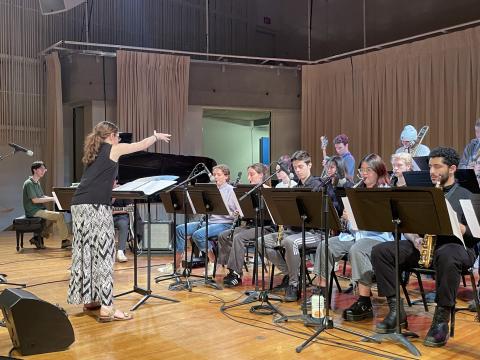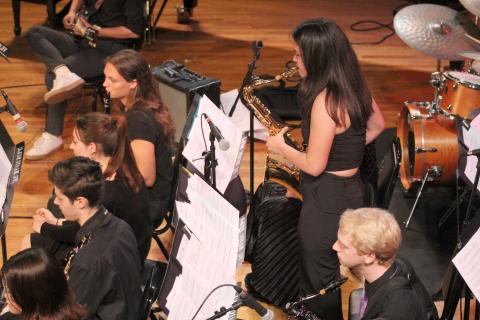Image

by Victoria Henry '25
January 26, 2023

On November 5, 2022, as Buckley Auditorium filled with students and parents for the Family Weekend All-Play Concert, there was a sense of excitement in the air. After all, it was the first time that all three of Amherst’s large music ensembles were playing in the same concert. It was also a concert two years in the making – originally meant to take place in 2020 to celebrate the bicentennial of the school and the centennial of women’s suffrage. For the students in the jazz big band, the concert was special because it presented a unique opportunity to debut an original jazz composition: Soliloquy by New York City-based composer and conductor Erica Seguine.
Prior to the performance, students at Amherst had a chance to get to know Seguine. As a composer in residence, Seguine held one-on-one sessions with Amherst composition students as well as a Q&A session with students in MUSI-213: Jazz Theory and Improvisation. She also gave a listening session where she discussed her musical influences and oversaw two rehearsals with the big band. Having composers come in and lead rehearsals is incredibly valuable for musicians: “They’re going to say concepts and directions in ways that are different from how I’d say things,” stated Bruce Diehl, director of the school’s Jazz Performance program. “If maybe the way I’m talking about concepts isn’t connecting with the students, hopefully something the guest says connects those dots for them.”
This opportunity was made available to students through Amherst’s Jazz Performance program, which has been run by Diehl for the past 20 years. After getting his Masters of Music degree in Jazz Composition and Arranging from UMASS-Amherst, Bruce Diehl began working at Amherst college in 1996 as assistant to former director Andy Jaffe. At the time, his main job was to oversee the Jazz Ensemble on stage and in-dorm performances. When Jaffe left to work full-time at Williams College, Diehl took over the additional responsibilities inherent in a performance program.
Since Diehl began working at Amherst, the jazz performance program has seen many changes, especially in terms of instructor involvement and number of school-sanctioned performance opportunities. Prior to Diehl, there was always a school-led big band, which would normally perform 2-4 times per year. Combos were student run and organized, and would typically have 2-4 performance opportunities per year as well. Through the addition of coaches David Picchi, Geoff Cunningham and Carl Clements, Diehl enlarged the program so that student combos now receive biweekly coaching and support from the school. Having these additional combo coaches is important to Diehl: “One of the things I think our combo coaches do quite well is try to get knowledge of each student and what makes them tick. They try to find things that get you to engage with the music outside the two hour long rehearsal slots each week,” said Diehl. On top of that, all performing entities now receive around 5-7 performance opportunities per year, through opportunities such as the Jazz@Friedmann Room Performance Series, jazz combo masterclasses with jazz professionals, and the McBride ‘59 Commission Series. Some student combos also find non-sanctioned gig opportunities, on and off campus.
Since Diehl began working at Amherst, the jazz performance program has seen many changes..
This is a schedule that Amherst students enjoy. “I really like how they’re always willing to organize stuff,” said tenor saxophonist Camila Bonilla ‘26. “There are a lot of little concerts, actually gigs. I was pleasantly surprised the first time we performed at the Friedmann Room because it was packed!! That just made me so happy.” In fact, the changes to the program wouldn’t have been possible without student involvement and agreement. “The way we took it from 3 to 5+ performances was through student buy-in. They were skeptical at first, and concerned about time investment vs. musical return. We had to get them onboard,” said Diehl. Students have always been central to jazz at Amherst. In fact, the moniker jazz@Amherst originally came from a student in the late 90s - and now is used, as Diehl put it, as an “umbrella term for all we do as performers and scholars in the study and performance of this music.”
Most of the students in the big band participate in it alongside a jazz combo, so when they began to approach Soliloquy (the Erica Seguine piece) in mid-October, they were coming in with more than a couple months worth of regular practice on their instrument/voice. However, Soliloquy as a piece still presented a challenge. It’s slow, airy, and melodic, with an ending that required students to collectively improvise until the piece naturally resolved. “It took a lot of compositional nerve and confidence in us to write a piece that didn’t really have an ending,” stated Diehl, “but, man, when we finished and you saw how long she held that silent pause, you could tell she was digging it and we had accomplished her mission.” The open-endedness of the piece tied in well with the themes of the concert. “The theme was women’s suffrage and voting rights. From the piece, you get the sense of, ‘We’re not finished yet,’” said Bonilla. “Similar to right now, and how voting rights and voter suppression are still real. I think it was incredible how a piece of music could capture that.”

Coming up next: Jazz@Amherst is excited to have Virginia Tech Professor and composer Charles Nichols in residency for the yearly McBride ‘59 Commision Concert, which will be held February 18th in the Powerhouse.